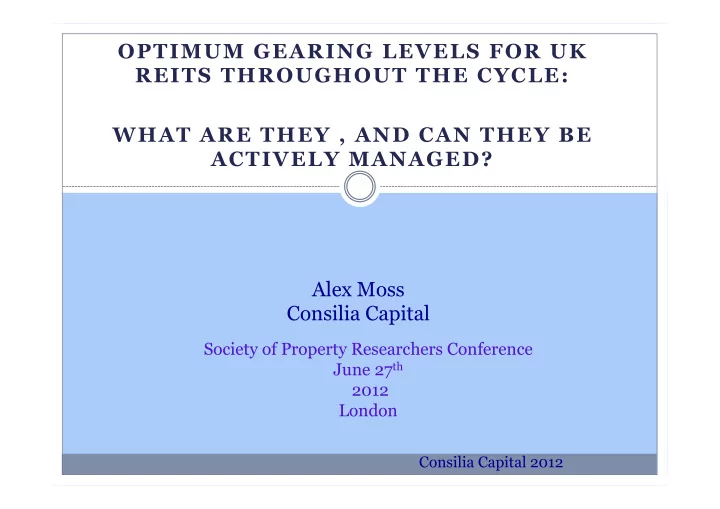

OPTIMUM GEARING LEVELS FOR UK REITS THROUGHOUT THE CYCLE: WHAT ARE THEY , AND CAN THEY BE ACTIVELY MANAGED? Alex Moss Consilia Capital Society of Property Researchers Conference June 27 th 2012 London Consilia Capital 2012
ISSUES TO CONSIDER 2 § 1) Defining “optimum” gearing levels § Start at the asset level - At its simplest , the amount of leverage required for underlying real estate portfolio to outperform i) equities , and ii) an absolute return benchmark? § The evidence throughout the period 1987-2011 § 2) Are LTVs actively managed? § How do we judge? Passive management means LTVs are determined by value movements at the asset level § The evidence throughout the recent cycle 2003-2011 § 3) Issues affecting LTVS going forward § Practical issues to consider § Outlook for UK REITs Consilia Capital 2012
OPTIMUM GEARING § Methodology § IPD and FT All Share data from the last 25 years § Calculated relative performance on an ungeared basis § For years where real estate underperformed : § Assumed IPD Index income yield, then calculated the amount of leverage required to boost capital values to match All Share Index § Repeated exercise with a total return benchmark
OPTIMUM GEARING LEVELS 4 How much leverage is needed to outperform the FTSE ALL Share ? 14 years out of 25……none ! Source: IPD Consilia Capital 2012
OPTIMUM GEARING LEVELS 5 When should we add gearing? ê Consilia Capital 2012
OPTIMUM GEARING LEVELS 6 How much leverage is needed to outperform an absolute benchmark – say 9% - 15 years out of 25 none ! Consilia Capital 2012
OPTIMUM GEARING LEVELS 7 When should we add gearing? ê Consilia Capital 2012
OPTIMUM GEARING LEVELS 8 Over the 25 year period average 2.1% capital return 7.2% income return FTSE All Share ave total return =7.3% Consilia Capital 2012
OPTIMUM GEARING LEVELS Initial conclusions: Ungeared performance at the asset level is sufficient to outperform both UK equities and an absolute return benchmark 14-15 years out of 25 Adding gearing could have improved this performance further, BUT capital value changes were negative in 8 of the 25 years so gearing would not have improved relative performance In 3 years capital value changes were negative, but income support was sufficient to generate outperformance Ungeared capital value movements are highly cyclical , and over time are a small proportion of total return.
ARE LTV LEVELS ACTIVELY MANAGED? Methodology Take average LTV ratios for the UK sector (EPRA data) On an annual basis calculate the impact on start of year LTV of IPD capital value movements Compare to actual LTVs shown Calculate for subsequent years The difference between the two will show the extent of active management
ARE LTV LEVELS ACTIVELY MANAGED? • Results imply a level of active management
ARE LTV LEVELS ACTIVELY MANAGED? • Initial conclusion of this is that while capital values have a significant impact, the LTVs of the UK listed sector are not merely driven by capital changes, and at different stages of the cycle they have been actively managed to an extent, both to increase and decrease the ratio.
ARE LTV LEVELS ACTIVELY MANAGED? Recent examples 1) Increasing debt (via drawdown) to repay equity investors (Unibail), 2) the issue of equity to maintain LTVs at manageable levels (Eurocommercial) 3) taking debt off the balance sheet via a JV (British Land sale of 50% of Broadgate ) 4) selling assets purely to reduce debt (the UK sector 2008-9)
MANAGING LTV LEVELS Practical considerations – equity valuation Land Securities Dis. to NAV Pre REIT Status Post REIT Status 20 Avg: -23.6 Avg: -16.8 10 0 -10 LT Avg: -20.6 -20 -30 -40 -50 1 1 2 3 3 4 5 5 6 7 7 8 9 9 0 1 1 0 0 0 0 0 0 0 0 0 1 1 0 0 0 0 0 1 - - - - - - - - - - - - - - - - - n p y n p y n p y n p y n p y n p a e a a e a a e a a e a a e a a e J S M J S M J S M J S M J S M J S
MANAGING LTV LEVELS Relative cost of debt and equity Bond Yield (4.999 2031 365MM ) British Land Dividend Yield 6.50 6.00 5.50 5.00 4.50 4.00 10-May-11 24-May-11 05-Jul-11 19-Jul-11 04-Jan-11 18-Jan-11 01-Feb-11 15-Feb-11 01-Mar-11 15-Mar-11 29-Mar-11 07-Jun-11 21-Jun-11 12-Apr-11 26-Apr-11 02-Aug-11 16-Aug-11 30-Aug-11 13-Sep-11 27-Sep-11
OUTLOOK FOR UK REITS Historically LTVs have been in the range 35-65% Going forward they are likely to be at or below the lower end of this range because of: The lack of available bank debt Greater focus on income rather than capital due to REIT dividend payout rules Minimal capital growth projections A desire from investors for secure cash (dividend) income rather than cyclical unrealized capital growth A need for UK REITs to follow the example of US REITs and actively use equity capital markets to finance expansion if the sector is to remain significant in a global context.
Recommend
More recommend